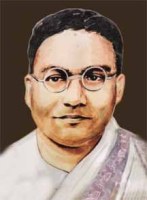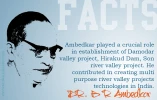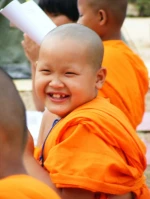Dr. Babasaheb Ambedkar had rightly said that wherever these upper caste hindus will go they will bring caste system and discrimination with themselves.
It’s a prejudice that’s been outlawed in India. But now it seems caste discrimination could be creeping into daily life in Australia.
Mitra and Rita Pariyar came to Australia three years ago, believing they would leave behind the prejudice they faced in Nepal. They were wrong.
A recent lunch in Sydney revealed how deeply ingrained the couple’s caste status is — even among friends.
“The only burgers left were beef burgers and what my friends told me was that it was alright for me to pick up the beef because I was an untouchable and therefore I shouldn’t really mind about it,” Mitra says.
“But I felt offended about it because I consider myself as much a Hindu as they are.”
Mitra and Rita are Damais — members of one of Nepal’s lowest Hindu castes, otherwise known as untouchables.
Mitra says they’re frequently the targets of jokes by other members of the Australia’s Nepalese community.
“It’s almost a part of their lingo that they use these derogatory terms. You are damai, you are as black as a kami, these comments are common. So the upper caste people might not feel it, they might use it as a form a joke, but it badly hurts us.”
Employment discrimination
Two weeks ago, Rita was interviewed for a job. She says the interview was going well — then the Nepalese interviewer learned her surname.
A week later, Rita called the manager to confirm her start date.
“She said No. And I said why? And she said no reason, I am going overseas, like that. And I feel that I am low caste, and that’s why.”
But the discrimination extends beyond employment prospects.
Mitra says their low caste identity also isolates him socially within the Nepalese community.
“The discrimination or the exclusion is more subtle – they won’t say ‘you are low caste, get away,’ but it’s more likely that I am not included in family events, and functions and festivals. There is more open and more formal sort of segregation as well, that’s because caste associations are creeping in in the country.”
“They use these derogatory terms, ‘You are damai, you are as black as a kami’ – these comments are common. So the upper caste people might use it as a joke, but it badly hurts us.”
Raj Azad agrees caste discrimination is happening in Australia.
He is a Dalit — a caste so low in India that it is not recognised officially in the country’s social hierarchy — and has found the discrimination he faced in India had followed him to university in Melbourne.
“In my class I found two boys arguing with each other and they were using different caste names to abuse each other.”
“Indians are really good at identifying the castes of each other. They microscopically peel it layer by layer and then they come to know and that is what hurts me.”
Monash University researcher Lavanya Raj says when Indian Australians realise she’s a Dalit — also known as an untouchable — they change the way they behave towards her.
Her flatmate was from the highest caste, Brahmin, and when he found out her caste their once friendly relationship turned sour.
“Once we were just having a discussion and I was supposed to give him some money – some money that we use for the house to buy stuff,” she says.
“When I gave it to him, he put his hands out as if he was going to take it but then something told him in his mind that probably he should not touch me, and he withdrew his hand and asked me to keep the money on the table.”
“I was extremely angry and I threw the money, not exactly on him but somewhere near him and I walked off.”
A widespread problem
Many South Asian countries have outlawed caste-based discrimination, while in Britain, caste is recognised as a form of discrimination under its equality act.
John Kennedy is president of the United India Association, a group representing many Indian-Australian associations in Sydney.
He acknowledges caste is increasingly creeping into Indian-Australian communities, but he rejects the practice.
“Casteism, yes I can see that certain communities have started their own caste-based associations in Australia, and I can see that it is being practised in Australia,” he says.
“But as an Australian citizen I don’t want this to happen.”
“If racism is not allowed in this country, why should casteism?”
There are around 100 Australian-based Hindu temples and their priests all belong to the Brahmin caste.
Co-founder of Sydney’s Helensburgh Hindu temple, Natarajan Iyer, says currently there’s no need to appoint priests from lower castes.
“99 per cent of them will be Brahmins. If there is a need we may consider it. Right now, we are not in that sort of a situation.”
The law in other countries
Caste discrimination is outlawed in many South Asian countries, including India and Nepal. Other countries affected are taking steps to address the issue.
Britain’s House of Lords adopted an amendment outlawing caste discrimination in 2013.
So far, a caste discrimination case has not reached the Australian courts.
Race Discrimination Commissioner Dr Tim Soutphommasane says there is no legal mechanism to address complaints for caste discrimination in Australia.
“If racism is not allowed in this country, why should casteism?”
“If there is discrimination that involved caste alone, then it’s by no means clear that we would accept the complaint. Caste is not specifically covered under the discrimination law that we have at the federal level.”
Professor Simon Rice from the Australian National University College of Law says caste-specific laws are not needed in Australia, as it is covered by other legal mechanisms.
“I don’t know that we need to legislate specifically for caste. Race covers a whole range of characteristics- skin colour, for example, nationality, ethnic origin, caste will just be another one in the list.”
But Mitra says specific recognition of caste-based discrimination in Australia would help to stop its spread.
He says it would also help vindicate those members of the community experiencing caste discrimination.
“If racism is not allowed in this country, why should casteism?”
–With Raymond Selvaraj and Kulasegaram Sanchayan from SBS Radio Tamil
Source – SBS




